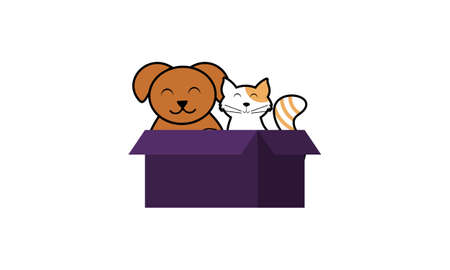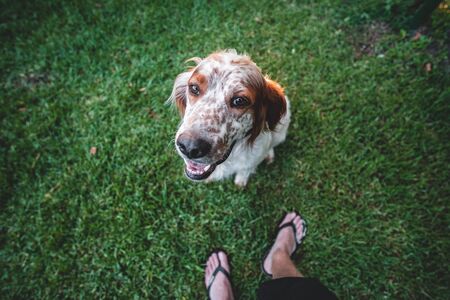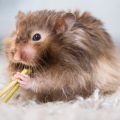Understanding the Aging Process in Small Pets
As our small pets like rabbits, guinea pigs, hamsters, and mice grow older, they go through a unique aging process that impacts both their physical and behavioral health. Unlike dogs or cats, these tiny companions often have shorter lifespans and display age-related changes more rapidly. Physically, you might notice signs such as graying fur, reduced mobility, dental issues, or changes in appetite and weight. Behaviorally, senior small pets may become less active, sleep more, or show shifts in social interaction—sometimes becoming either more withdrawn or seeking extra comfort from their human family members. Recognizing these changes early is essential for providing the best care possible. Understanding how aging affects your pet’s body and mind allows you to adjust their environment, nutrition, and daily routine to help them stay comfortable and happy throughout their golden years.
Common Signs of Aging in Small Pets
Recognizing the early warning signs that your small pet may be entering their senior years is essential for providing timely care and support. While aging affects every species a bit differently, there are some common signs to watch for across rabbits, guinea pigs, hamsters, gerbils, rats, mice, and other small pets. Often, these changes can be subtle at first, so it’s important to observe your pet’s behavior and physical condition closely.
Physical Changes
| Sign | Description |
|---|---|
| Decreased Activity | Your pet may spend more time resting or sleeping and show less interest in play or exploration. |
| Weight Fluctuations | Noticeable weight loss or gain can occur as metabolism slows or eating habits change with age. |
| Changes in Fur or Skin | Fur may appear duller, thinner, or patchy; you might also notice dry or flaky skin. |
| Mobility Issues | Limping, stiffness, difficulty climbing or jumping may indicate arthritis or joint discomfort. |
| Sensory Decline | Reduced vision or hearing is common—your pet might startle easily or seem less responsive. |
Behavioral Changes
- Altered Social Behavior: Senior pets may become more withdrawn, less interactive with humans or cage mates, or conversely seek more attention and comfort.
- Litter Box Accidents: Older pets sometimes have trouble reaching or using their litter areas reliably due to mobility issues.
- Changes in Eating Habits: A decrease in appetite or preference for softer foods could signal dental problems commonly seen in aging small animals.
- Grooming Habits: Your pet may groom less often, leading to a scruffy appearance and increased risk of skin issues.
Why Early Detection Matters
The sooner you spot these changes, the quicker you can adapt your pet’s environment and healthcare routine. Regularly tracking your pet’s habits and consulting with an exotic vet at the first sign of decline will help ensure a comfortable and happy senior life for your furry friend.

3. Adjusting Nutrition and Diet for Senior Pets
As small pets age, their nutritional needs can change significantly. Older animals may become less active, have slower metabolisms, or develop health conditions that require dietary adjustments. Providing the right nutrition is crucial in supporting your aging pet’s quality of life and overall well-being.
Understanding Changing Nutritional Requirements
Senior small pets—like rabbits, guinea pigs, hamsters, or gerbils—often need fewer calories to avoid weight gain as their activity levels decrease. However, they still require nutrient-rich foods to maintain muscle mass and support organ function. Consulting with a veterinarian who understands exotic and small pet care can help you determine the ideal balance for your pet’s age, breed, and health status.
Choosing the Right Food
Look for high-quality commercial diets formulated specifically for senior pets. These often contain added fiber to aid digestion and lower fat content to prevent obesity. For some species, like aging rabbits or guinea pigs, fresh vegetables rich in vitamin C and leafy greens are essential. Always introduce new foods gradually to avoid upsetting your pet’s stomach.
The Role of Supplements
Supplements such as omega-3 fatty acids, glucosamine, or probiotics may be beneficial for certain senior pets, helping support joint health, digestion, or immune function. However, not all supplements are suitable for every species—so it’s important to get personalized advice from your veterinarian before adding anything new to your pet’s regimen.
By paying close attention to dietary changes and working closely with your vet, you can help ensure that your small pet remains comfortable and healthy throughout their golden years.
4. Supporting Mobility and Comfort
Aging can bring about noticeable changes in your small pet’s energy levels, joint health, and overall mobility. As a loving pet parent, it’s important to create an environment that supports their comfort and helps them stay as active as possible. Here are practical tips for adapting your pet’s living space to meet their changing needs:
Make Movement Easy
- Low-Entry Bedding: Choose beds with low sides so older pets can step in and out without straining.
- Non-Slip Surfaces: Place non-slip mats or rugs around your pet’s favorite areas to prevent slipping on smooth floors.
- Accessible Food and Water Bowls: Raise bowls slightly to reduce neck and back strain, and keep them within easy reach.
Reduce Obstacles in Their Environment
- Clear Pathways: Remove clutter or furniture that might block your pet’s usual routes.
- Gentle Ramps or Steps: Install ramps or steps to help pets access couches, beds, or other elevated surfaces safely.
Focus on Joint Health
Joint health is especially important for aging pets. You can support their joints by providing orthopedic bedding and considering supplements (ask your veterinarian first). Regular gentle exercise, like short walks or interactive play, can also help maintain flexibility and muscle tone.
Adapting Your Pet’s Home: Quick Reference Table
| Challenge | Adaptation Tip |
|---|---|
| Trouble Climbing | Add ramps or pet stairs to favorite spots |
| Slippery Floors | Lay down non-slip mats or rugs |
| Difficult Getting Up | Use orthopedic or memory foam bedding |
| Pain When Eating/Drinking | Elevate food and water bowls |
Your Role as a Caregiver
Your small pet depends on you to notice changes and make adjustments that will help them age comfortably. Check their environment regularly for new hazards and continue offering gentle encouragement for movement. By making simple changes at home, you’ll help ensure your pet’s golden years are filled with comfort and love.
5. Preventive Health Care and Regular Vet Visits
As small pets age, their health care needs become more complex and require closer attention. Preventive health care is one of the most effective ways to help your pet enjoy a longer, healthier life. Scheduling regular vet visits—at least once or twice a year—is key to catching age-related issues early. These checkups allow your veterinarian to monitor for subtle changes in weight, mobility, dental health, and organ function that you might not notice at home. Early detection of problems such as arthritis, heart disease, or tumors means you can start treatment sooner, which often leads to better outcomes.
Wellness exams for senior small pets usually include blood work, urine tests, and sometimes x-rays to assess overall health. Your vet can also offer guidance on vaccinations, parasite prevention, and diet adjustments tailored to your pet’s changing needs. Even if your aging pet seems healthy, don’t skip these checkups—many conditions develop slowly and are easier to manage when caught early.
Remember, preventive care isn’t just about medical exams. It includes keeping up with grooming, dental hygiene, and providing a safe living environment free from hazards. By being proactive and maintaining regular communication with your veterinarian, you’ll be better equipped to support your small pet through the challenges of aging while maximizing their comfort and quality of life.
Promoting Mental Well-being in Older Pets
As small pets age, supporting their cognitive health and emotional wellness becomes just as important as caring for their physical needs. Just like humans, older pets can experience changes in memory, awareness, and responsiveness. Fortunately, providing mental enrichment and gentle interactions can help keep your aging companion engaged, happy, and thriving.
Enrichment Strategies for Cognitive Health
Enrichment activities stimulate your pet’s mind and prevent boredom or cognitive decline. For small pets such as rabbits, guinea pigs, hamsters, or geriatric cats and dogs, consider rotating safe toys regularly to maintain novelty. Food puzzles and treat-dispensing toys encourage problem-solving while rewarding curiosity. You might also rearrange habitats slightly or introduce new textures and scents to explore. Even short training sessions using positive reinforcement can keep their minds sharp and strengthen your bond.
Gentle Social Interactions Matter
Aging pets often crave comfort and reassurance from their caregivers. Spend time each day quietly talking to or gently stroking your pet if they enjoy touch. Allow them to approach you on their terms—never force interaction if they seem tired or withdrawn. For social species like guinea pigs or birds, companionship from another pet may offer emotional support, but always monitor introductions carefully to ensure safety and compatibility.
Creating a Calm Environment
A peaceful environment reduces stress for older animals. Keep noise levels low and minimize sudden changes in household routines. Offer cozy hiding spots or soft bedding where your pet can retreat when they need downtime. Pay attention to signs of anxiety, such as pacing or excessive grooming, and consult your veterinarian if you notice behavioral changes that concern you.
When to Seek Professional Guidance
If you observe confusion, disorientation, or significant changes in temperament, reach out to your veterinarian. These may be signs of age-related cognitive disorders or underlying health issues that require medical attention. Early intervention can improve quality of life and comfort for your aging companion.
By incorporating enriching activities and maintaining gentle routines, you can help support the mental well-being of your senior pet. Your attentive care not only helps preserve their cognitive function but also ensures they continue to feel loved and secure throughout their golden years.

